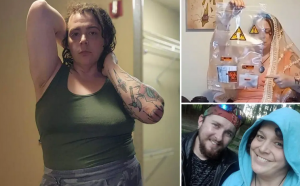In August, The Rage Monthly received a letter from a gay prisoner at Pleasant Valley State Prison in California. The letter can be described best as a plea for help following alleged inhumane treatment by corrections officers. The prisoner claimed that corrections officers were using the public address system and bullhorns to encourage inmates to beat and brutalize gay and transgender prisoners in Building 1 of D Yard. He named a particular senior corrections officer as the main instigator of the alleged assaults. The prisoner also charged that gay and transgender prisoners were being denied food and basic hygiene, including access to showers, and he further claimed that corrections officers had destroyed the mail of gay and transgender prisoners. Even more disturbingly, the letter went on to allege that gay and transgender inmates were assigned more work details and were being thrown in the Security Housing Unit (SHU), also known as “the hole,” simply for their sexual orientation or gender identity. The prisoner stated that if the guards knew that he’d written this letter, they would retaliate, a claim that is being taken very seriously by my editors, elected officials and me.
Upon receipt of this letter, I contacted Black and Pink, a Massachusetts-based organization that is dedicated to protecting the rights of LGBT prisoners. The mission of the organization is to speak out on “the specific violence of the prison industrial complex against LGBT people, and respond through advocacy, education, direct service, and organizing.” As it turns out, they know the prisoner. After careful evaluation, we came to the conclusion that he would not have intentionally placed himself in harm’s way by writing this letter unless his allegations had a real basis.
Since August, I have made numerous attempts to verify the prisoner’s claims with the California Department of Corrections and Rehabilitation (CDCR), but the CDCR has given me no comment on the prisoner’s allegations other than a brief phone call from an information officer based in Sacramento. During that phone call, the officer would not let me speak; he would either shout over me or ask how I knew that the content of the letter was true. My response: “I am calling you to verify that the allegations are true, and to get the response of the CDCR.” He claimed that he would get back to me, but he never contacted me again.
A copy of the prisoner’s letter was provided to California Assembly Majority Leader Toni Atkins (D-San Diego). A statement released by her office read as follows: “Our office has made inquiries with the Department of Corrections and is awaiting a response. We will continue to renew our inquiries as needed.”
Most people have preconceived notions of what it is like to be incarcerated. I know that my idea of prison is far from the reality, so I asked Harper Jean Tobin, Esq., Director of Policy at the National Center for Transgender Equality, to comment on the prisoner’s allegations and educate me on the realities of prison life for LGBT prisoners. Here is what she had to say:
These allegations are sad and disturbing, and they echo what we know many LGBT people have experienced. As a society we are spending more and more on prisons that are crowded, inhumane, and violent. In this context, LGBT people are among the most vulnerable prisoners, experiencing abuse at far higher levels from both staff and other inmates. LGBT prisoners tell stories of daily humiliation by staff and inmates alike, months or years in solitary confinement, and indifference or retaliation when they report sexual assault — all because of who they are.
National standards under the Prison Rape Elimination Act of 2003 (PREA) require prison systems to change how they do business to ensure that prisoners, including LGBT prisoners, are protected and not subjected to cruel and unusual punishment. This means making individual, humane decisions rather than relying on solitary confinement or automatically housing a prisoner according to their anatomy rather than their gender identity. It also means ending humiliation and retaliation.
We are starting to see some changes, and some officials are truly committed to upholding the law, but there is still a long way to go. Our public officials need to be vigilant in ensuring that these standards are followed, that bias and cruelty are not tolerated, that institutional culture is changed, and that factors that contribute to abuse, such as overcrowding, are addressed.
Kylar W. Broadus, Esq., Senior Policy Counsel on Transgender Civil Rights Project for the National Gay and Lesbian Task Force, gave me some statistical information on the prison system:
In 2008, the National Center for Transgender Equality (NCTE) and the National Gay and Lesbian Task Force launched a nationwide study of anti-transgender discrimination in the United States. Over a six-month period, 6,456 transgender and gender non-conforming people answered a seventy-question survey, reporting on their experiences of discrimination and abuse at home, in school, in the public sphere, and in the workplace, as well as with landlords, doctors, and public officials, including judges and police.
The survey results revealed that transgender and gender non-conforming people face pervasive discrimination in virtually all aspects of their lives. Possibly the most dangerous gendered space for transgender and gender non-conforming people is jail or prison, where there is no escape from harassment and assault at the hands of corrections officers and other inmates.
Correctional staff are frequently cited as participating in harassment, violence, and sexual assault — a serious abuse of authority. Abuse and violence continues in situations where transgendered individuals often have no protection or escape.
Here are some relevant findings from the study that Broadus references:
- Harassment: Transgender prisoners face harassment by correctional officers, staff, and other inmates. Thirty-five percent of respondents who had served time in jail or prison reported harassment by other inmates. Thirty-seven percent reported harassment by correctional officers or staff. About half (44 to 56 percent) of respondents of color who had served time in jail or prison had experienced harassment by officers or staff. This is a higher rate than that of their white peers.
- Sexual assault: In addition to harassment, some transgender individuals who are incarcerated face physical and sexual assault. Respondents who had served time in jail or prison reported alarming levels of physical assault (16 percent) and sexual assault (15 percent) perpetrated both by other inmates and by staff. Black respondents reported the highest incidence (34 percent) of sexual assault in prison by other inmates or by staff. Transgender women of color were particularly vulnerable to sexual assault while incarcerated. Thirty-eight percent of black transgender women respondents who had served time in jail or prison reported having been sexually assaulted either by another inmate or by staff.
- Other abuse: Respondents who had been incarcerated also reported abuse through denial of general health care and hormone therapy. Denial of hormone treatment can be physically painful and damaging to a person’s physical and mental health.
I believe that prison is bad enough without having to endure mistreatment for being LGBT, but after two months of research and reading this report by the California Correctional Peace Officers Association, I worry that some employees of the CDCR might believe that they are free to violate basic human rights and fair treatment of prisoners. The CDCR should have oversight and accountability to the taxpayers and state officials. California is not a Third World country, after all.
I have no sympathy for people who abuse their authority and beat up other people, so I will be following up on this situation with the CDCR. I assure you that if the prisoner’s allegations are true, any corrections officers who are found to be perpetrators of the alleged abuse will quickly find that they are not above the law.
But to those employees of the CDCR who are doing their work with integrity: I thank you for your public service.
Elizabeth Mcelroy contributed to this blog post.






